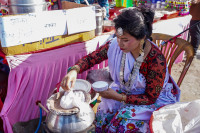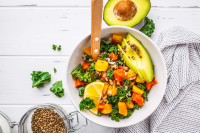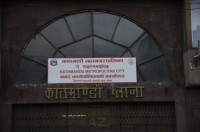Food
Cashing in on the international hemp wave
It’s a superfood, it’s used in oil, shampoo and even toothpastes—the marijuana look-alike is proving a profitable business here in Nepal too..JPG&w=900&height=601)
Tsering Ngodup Lama
When Pawan Raj Joshi was visiting his children in the US, he noticed that a lot of retail outlets had products made from hemp. “There were shampoos, soaps, toothbrush, all made from hemp. There were even restaurants serving dishes that had hemp seeds as one of the ingredients,” said Joshi. That was two years ago.
It was following that visit to the US that Joshi started toying with the idea of doing something with hemp back home in Nepal. He started researching everything about hemp—things he could make, the type of seeds he would need, and most importantly, the legal aspects of making hemp products in Nepal. And around five months ago, Joshi started producing non-refined hemp oil under the brand name Dava.
Today, his company is among a small but growing number of businesses producing packaged hemp seeds and oil.
Unlike marijuana, hemp contains 0.3 percent or less Tetrahydrocannabinol (THC), thus, it doesn’t have any mind-altering effects. People have used hemp to make ropes, clothing and have even used it for medical purposes. But in the early 20th century, hemp cultivation was made illegal in many countries across the globe. In the US, a country that has one of the largest hemp industries in the world, the Farm Bill, which was signed into law in the US in December 2018, made hemp cultivation legal across the US. According to New Frontier Data published in February, China led global hemp sales with $1.3 billion with the US at second with $1 billion in sales.
“We see a resurgence in hemp globally, and if Nepal can capitalise on it, hemp can go on to become a very valuable crop for Nepali farmers,” said Joshi. While hemp seeds have been classically used in various dishes in South Asia, it has remained an unsung ingredients. One of the reasons for the growth in hemp demand is its healing properties, says hemp entrepreneurs. According to Medical News Today, hemp seeds are rich in protein, fibre, omega-3 and omega-6 fatty acids. The seeds also have antioxidant effects and could help improve the health of the heart, skin, and joints.
Joshi sources his hemp seeds from Pokhara and Nepalgunj, where he has a factory. “At the factory, the seeds are processed and pressed to make oil,” said Joshi. “Before setting up our factory, we tried various oil pressing machines available in the country to press hemp seeds, but none of them worked. After much research, we came across an Italian-made machine that did the job. We placed an order for it, and set up our factory.”
In the previous harvesting season, Joshi procured 10,000 kgs of seeds. According to him, one 100 kgs of hemp seeds produce about 20 litres of hemp oil.
.JPG)
Himchuli Food Packaging Industries, one of the first businesses to sell packaged hemp seeds, started selling hemp seeds in 2016. According to its Managing Director, Shiva Raj Ghimire, the company sources its hemp seeds from Jumla. “It was only after learning about the many health benefits of hemp seeds that we decided to get into hemp seed business,” said Ghimire. “In our first batch, we purchased around 50 kgs of hemp seeds from Jumla, but in the last few years, the demand has increased, and now buy around five quintals of hemp seeds from Jumla every year.”
Ghimire’s company has also branched out from selling just hemp seeds. “We also sell powdered hemp seeds and hemp seed oil,” said Ghimire. “Our hemp seeds and powder are used mainly to make pickle, and the oil is used mainly as a massage oil. There’s a lot of demand, but there’s also a lot of legal ambiguity when it comes to hemp.”
Both Joshi and Ghimire rely heavily on online sales and farmer’s markets to sell their products. “We have so far relied solely on word-of-mouth publicity, and with the kind of market reception that we have seen, we are forecasting healthy growth in the future,” said Joshi. For the company’s next production season, Joshi is planning to double its hemp seeds order to 200 quintals.
But one of the major challenges entrepreneurs like Joshi and Ghimire face is the misconception surrounding hemp. “Because hemp and marijuana look alike, authorities often destroy hemp plants thinking they are marijuana plants,” said Joshi. “We have been lobbying with the government to legalise commercial hemp plantation.”
According to Ghimire, farmers in Jumla fetch about Rs 150 for every kg of hemp seeds.
For Joshi, who has until now only sold his hemp seed oil in the local market, it’s the export market that he has his eyes set on. “The demand for hemp products is huge in many countries in the West. That’s where we want to focus on in the future,” said Joshi, who now plans to diversify his product line up. “We have already started setting up the infrastructure and acquiring technical know-how to start producing hemp shampoo, soaps, toothpaste. In the next few years, we will be producing these products, and we already have buyers from the US and Canada interested in buying from us. From how I see it, the possibilities are endless. All that the government needs to do is bring in policies that would make it convenient for entrepreneurs to work with hemp.”




 9.83°C Kathmandu
9.83°C Kathmandu










